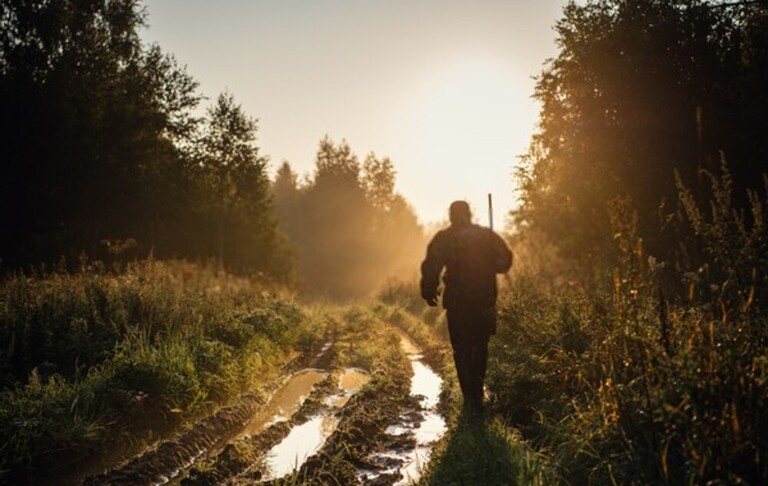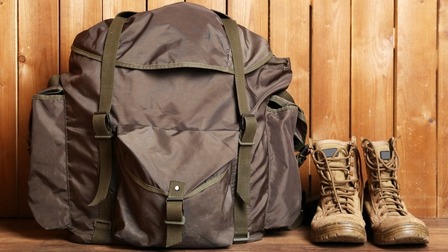Getting lost while hunting is not a rare situation for hunters, especially when they are in a new area. That’s why everyone should equip themselves with survival skills to get through such struggles and find the way out.
Want to know how to survive if you get lost hunting?
Read this article!

Keep Calm
Fear is the most dangerous thing in all situations.
It won’t help you to solve the problem that you’re struggling with. Furthermore, it causes you to lose your energy and your mind will become unstable, resulting in some foolish decisions that might be made.
The lesson here is regardless of whether you can find a way out or not at that time, try to keep your mind calm and consider the situation.
When realizing that you get lost, chances are that you will be panicked. Stand back and take a deep breath until your heartbeat is slower and more stable.
Get Attention
Stand still and start making noise by hitting rocks, singing, screaming, or whistling. This way will easily get the attention of your hunting partners or anyone if they are nearby.
Determine The Direction
Use any navigation device that you have to find your way out of the woods to the nearest residential area before dark.
Check if the online/offline GPS app on your smartphone is working.

If you have a compass, place it on a flat, horizontal surface during use for the most accurate navigation results.

Keep it away from fire and metal objects, otherwise, the magnetic needle will lose its function.
Now, what to do if you have no GPS devices at hand? You’ve two alternative solutions:
Solution 1: Climb up to a tree as high as possible and take a close look at every place you can see, such as towers, fields, smoke, houses, or trails - any sign of human’s life. This helps you decide in which direction to go.
If you can’t see or hear anything, try to find a stream or a river. Those trees that grow close to a river or stream are commonly greener than others.

Next, just go downstream (according to the flow of the water). Chances are that you’ll find a residential area or get out of the dangerous zones.
Note: When finding the way out, remember to mark out where you’ve been through to avoid getting lost further or walking around an area unnoticeably.
Solution 2: Determine direction through the sun and stars.
The sun rises on the East, goes down on the West. If you’re looking at the rising sun, your left hand indicates North, and the right one is South.

At night, Ursa Major or the Great Bear is very useful to find directions. https://www.youtube.com/watch?v=7DjJ3r4XG0E
Learn The Area Where You Are In
If it’s twilight and you haven’t found the way out yet, accept the truth that you might have to spend one night in the wildlife.
Mark your standing position, then start walking around to search for a water source and a safe place to sleep.
Search For Water Sources

Rivers or streams frequently flow downhill, so, search around low-lying areas or the bottom of a slope, there are more chances to find a water source.
Search For A Shelter

It’s best if you bring a camping tent, just find a dry, flat, high-lying spot to pitch it.
In case that you have no tent at all, look for an empty cave where there’s no bear, snake, or leopard.

Or, find a fallen tree trunk and arrange some large branches around it to create a shelter frame. Line it with lots of leaves to keep you warmer against cold ground.
Search For Safe Food Sources
Aside from the sandwich slices that you might bring along, find some other safe food sources as backup plans.
If you’re near a river, fish is a great choice.

Only eat those fruits and mushrooms that you surely know them. Avoid the unknown ones. It’s better to be hungry rather than getting sick in the wild.
Grasshoppers are surprisingly nutrient-rich and tasty food if they’re cooked.
Set Up The Fire

An effective way to keep you warm at night as well as protect you from unfriendly wild animals, like bears and leopards are setting up the fire.
Make sure that it is away from dry leaves or any flammable objects.
Clear the ground before getting started. Keep a small fire pit and try to create lots of smoke, which is also a way to send emergency signals if there’s somebody near you.
Conclusion
Aside from learning survival skills, it is necessary to make good preparation before any hunting trip to minimize the risks of getting lost. Be sure to bring a compass, an EDC knife, and other essentials that can help you survive in the wildlife when bad things happen.
That’s all for this guide on how to survive if you get lost hunting. Thanks for reading!













